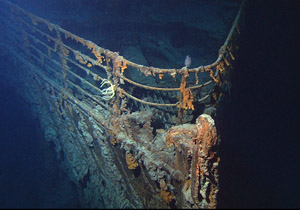June 15, 1010
Bad news from the Gulf continues to flow. Much of it is about which culprits to blame and who pays. Stock caps, bonuses, and dividends are at risk. Liability lawyers circle their own version of black gold. This fiasco point up how a huge economic superstructure is built on the ability of direct workers to do the right thing at the right time. Reporting is like barroom rants on a team losing a game that it should have won: Shall we blame the coach, the players, the referees, or the general management?
Industry optimists suffered from “Titanic Syndrome,” disbelief that a big, state-of-the-art rig had sunk, and that disaster was real. If oil flow keeps flowing and hurricanes roil it, it will get worse before it gets better. Everybody loses. Our seafood supply is curtailed indefinitely. No one knows what will happen from goo deep in the ocean for decades.
Money can’t restore the Gulf. It can only pay for partial remediation. Then nature must heal itself if it can, over many years. Nobody can pay for this; not BP; not the federal government or any other government, no matter what taxes are paid, debt incurred, or speed of monetary disbursement.
Now that oil is loosed, the only people actually doing anything are on the scene, on boats or rigs, or along the shoreline. They and everyone directly supporting them are working at it, effectively or not. All the rest of us are mere bystanders.
Before the blowout, the only people who could have prevented it were directly involved at the drill site, or supporting them with what they need to do the work. Executives, regulators, financiers, experts, politicians, or pundits weren’t there. If the workers do not understand the technology, and do the right thing at the right time, all else is useless. The best that any higher organization can do is to prepare direct workers to take this responsibility, including go or no-go decisions.
In the United States, governments do not drill for oil. No agency knew what to do in detail either. Before the blowout, President Obama knew zip about the drilling project in Block 252. Whether Tony Hayward knew much about it is doubtful. Far removed CEOs may know the technology, but not details of how work is being executed. Ultimately, only people in each work location can really be responsible.
This situation illustrates that companies like BP or Transocean have a social mission to provide energy without a screw up that affects everybody and everything. Such organizations are too important to fail. They don’t have to be big (think health care). Banks become too important to fail only when their size or interlocking trades affects almost everyone; then failure is catastrophic.
This undermines basic corporate logic – wealth maximization and limited liability. Corporations descended from limited liability chartered companies employed in colonial times to motivate investing in risky ventures that few individuals would dare take alone. If the ship from your venture sank, your money went with it, but you lost no more. That assumed a nearly infinite world to be conquered and expanded into. Adventurers assumed the risks of fate and a cruel nature. Loss of 18th century ships didn’t affect nature very much.
Now we must question 20th century business and economic thinking built on these basics. The scale of energy and material usage is enormous by comparison. Adventurers can damage nature irreparably in far more ways than by oil in the sea or exhaust fumes in the air. We don’t know the toxicity of many chemicals in use. A small concentration can have big unintended consequences. Those emotionally immune to the Titanic Syndrome stay aware of how much we don’t know. They don’t party on, ignoring icebergs.
Complacent optimism in high-tech tools, corporate logic, or bureaucratic dictums increases the chances of blowout. Vigorous learning organizations dedicated to a social mission are less likely to suffer from Titanic Syndrome. From fire departments to fertilizer companies, our most vital work organizations have a responsibility bigger than “maximum profit with minimum liability,” or “making budget.” Ideological debate about whether government or “free enterprise” is more competent doesn’t lead anywhere. We need to re-frame our view of a world very different from the 18th century.
A vigorous learning organization would be more rigorous than almost anything seen today. One can think NASA, but it too has had its problems. The big problem is human foibles.
“Compression” also describes the learning and responsibilities thrust on people. Vigorous leaning culture would have to counteract human weaknesses that present systems minimally restrain: Titanic syndromes, short-term biases; contentious gamesmanship; playing hero; hiding information; demonstrating superiority; unwillingness to listen.
To frame this situation realistically, go to direct workplaces. How would they have to function? From that, work back to determine the supporting policies needed to develop and support them. Success will be more difficult to come by than what we thought was success in the 20th century. We have to overcome the problems that century left behind – now, not when we get around to it. What we can do counts for more than what we get. Think of the earth as a space ship. What would market share or GNP mean?

